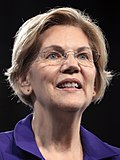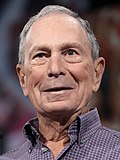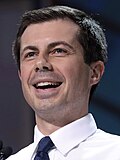2020 Democratic Party presidential primaries
Selection of the Democratic Party nominee / From Wikipedia, the free encyclopedia
Dear Wikiwand AI, let's keep it short by simply answering these key questions:
Can you list the top facts and stats about Democratic primaries 2020?
Summarize this article for a 10 years old
Presidential primaries and caucuses were organized by the Democratic Party to select the 3,979[lower-alpha 2] pledged delegates to the 2020 Democratic National Convention held on August 17–20 to determine the party's nominee for president in the 2020 United States presidential election. The elections took place in all 50 U.S. states, the District of Columbia, five U.S. territories, and Democrats Abroad, and occurred between February 3 and August 11.
| ||||||||||||||||||||||||||||||||||||||||||||||||||||||||||||||||||||||||||||||||||||||
| ||||||||||||||||||||||||||||||||||||||||||||||||||||||||||||||||||||||||||||||||||||||
|---|---|---|---|---|---|---|---|---|---|---|---|---|---|---|---|---|---|---|---|---|---|---|---|---|---|---|---|---|---|---|---|---|---|---|---|---|---|---|---|---|---|---|---|---|---|---|---|---|---|---|---|---|---|---|---|---|---|---|---|---|---|---|---|---|---|---|---|---|---|---|---|---|---|---|---|---|---|---|---|---|---|---|---|---|---|---|
| ||||||||||||||||||||||||||||||||||||||||||||||||||||||||||||||||||||||||||||||||||||||
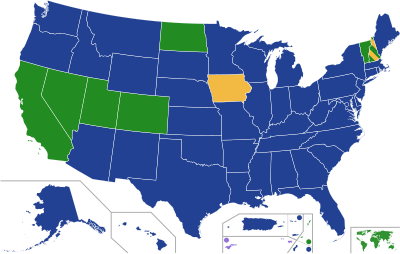  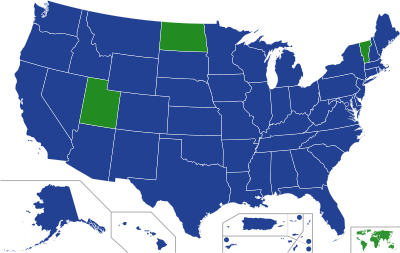
| ||||||||||||||||||||||||||||||||||||||||||||||||||||||||||||||||||||||||||||||||||||||
| ||||||||||||||||||||||||||||||||||||||||||||||||||||||||||||||||||||||||||||||||||||||
2020 U.S. presidential election | |||
|---|---|---|---|
| Attempts to overturn | |||
| Democratic Party | |||
| Republican Party | |||
| Third parties | |||
| Related races | |||
| |||
A total of 29 major candidates declared their candidacies for the primaries,[4] the largest field of presidential primary candidates for any American political party since the modern primaries began in 1972, exceeding the field of 17 major candidates in the 2016 Republican Party presidential primaries.[5] Former Vice President Joe Biden led polls throughout 2019, with the exception of a brief period in October when Senator Elizabeth Warren experienced a surge in support.[6] 18 of the 29 declared candidates withdrew before the formal beginning of the primary due to low polling, fundraising, and media coverage. The first primary was marred by controversy, as technical issues with vote reporting resulted in a three-day delay in vote counting in the Iowa caucus, as well as subsequent recounts. The certified results of the caucus eventually showed Mayor Pete Buttigieg winning the most delegates, while Senator Bernie Sanders won the popular vote in the state. Sanders then went on to win the New Hampshire primary in a narrow victory over Buttigieg before handily winning the Nevada caucus, cementing his status as the front-runner for the nomination.[7][8]
Biden, whose campaign fortunes had suffered from losses in Iowa, New Hampshire and Nevada, made a comeback by overwhelmingly winning the South Carolina primary, motivated by strong support from African American voters, an endorsement from South Carolina U.S. Representative Jim Clyburn, as well as Democratic establishment concerns about nominating Sanders.[9] After Biden won South Carolina, and one day before the Super Tuesday primaries, several moderate candidates dropped out of the race and endorsed Biden in what was viewed as a consolidation of the party's moderate wing. Prior to the announcement, polling saw Sanders leading with a plurality in most Super Tuesday states.[10] Biden then went on to win 10 out of 15 contests on Super Tuesday, beating back challenges from Sanders, Warren, and former New York City Mayor Michael Bloomberg, solidifying his lead.[10]
On April 8, Biden became the presumptive nominee after Sanders, the only other candidate remaining, withdrew from the race.[11] In early June, Biden passed the threshold of 1,991 delegates to win the nomination.[12][13] In total, seven candidates received pledged delegates: Biden, Sanders, Warren, Bloomberg, Buttigieg, Senator Amy Klobuchar and U.S. Representative Tulsi Gabbard.[14] On August 11, Biden announced that former presidential candidate Senator Kamala Harris would be his running mate.[15] Biden and Harris were officially nominated for president and vice president by delegates at the Democratic National Convention on August 18 and 19.[16][17] Biden and Harris went on to win the presidency and vice presidency in the general election on November 3, defeating the incumbents President Donald Trump and Vice President Mike Pence.
Biden became the first Democratic candidate since Bill Clinton, and the third ever Democratic candidate,[lower-alpha 3] to win the nomination without carrying either Iowa or New Hampshire, the first two states on the primary/caucus calendar.
The primaries were initially scheduled to go through June 6. However, the COVID-19 pandemic in the United States caused a number of states to shift their primaries to later in the year.


